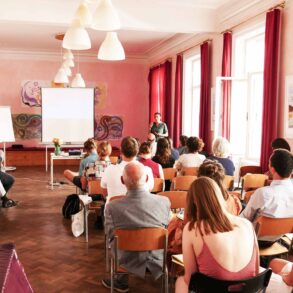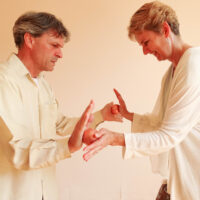Marginalia to Rudolf Steiner’s Life and Work, Number 25.
Before Rudolf Steiner met the famous reciter Alexander Strakosch in person, he had heard much about him from his friend Moritz Zitter. On January 14 and 16, 1892, Strakosch performed various poetic works at the Weimar Hoftheater, including Faust’s great monologue and a scene from Schiller’s ‹Demetrius›. Apparently, he sat talking with Rudolf Steiner for some time after the performance. It was close to midnight, when, «moved by the heightened temperature to bold declarations of friendship», they wrote a boozy postcard to Moritz Zitter.1 Zitter referred to the conversation in a letter on February 2, 1892, «You must have spoken of me very favourably, by the way, for he is totally delighted. Of you, he only speaks in superlatives!»2
Alexander Strakosch (born in Sebeskellemes, Hungary on December 3, 1840, died Berlin September 17, 1909), the son of a Jewish merchant, stuck out as a child because of his exceptional memory, which allowed him to recite long poems and the entire Book of Job by heart. He was therefore expected to become a preacher but trained as an accountant in Vienna and studied acting on the side. Being small in stature with the «head of a giant»3 meant, however, that he was not really suited to acting. Instead, he discovered the art of recitation for himself and went to Paris to study it. Later he worked as master reciter under Heinrich Laube at the Burgtheater and at the Volkstheater in Vienna. He became so famous that he could undertake grand tours of Europe, Turkey, and America. At the end of his career, he taught at the Max Reinhardt drama school in Berlin.
Strakosch married four times. Following the early death of his first wife, Toni Fürst (1852-1873), he married Anna Götzel (1852-1911) in 1874. The couple divorced in 1890 and Anna immediately married the then-popular writer Gustav Freytag. In January 1892, Rudolf Steiner learned to his great surprise from Alexander Strakosch that his divorced wife was a childhood friend of Helene Specht. Rudolf Steiner had spent six years with the Specht family in Vienna as a private tutor. In a letter to Pauline Specht he wrote, «He told me something I had not known: that he used to be a frequent visitor to your home and that the present Mrs. Freytag was a close friend of your sister’s. Amazing!»4 Strakosch also remarried: in 1891 he wed Ortrud Menzel in Silesia. The dissolution of this third marriage in 1902 casts an interesting light on the cultural conditions at that time. «Professor Strakosch is Israeli, his wife was a Protestant. Since such a mixed marriage is not permitted under Austrian law, proceedings for annulment were soon initiated.» At least the children from this marriage were «granted legitimacy.»5 A fourth marriage followed six weeks before his death, to his student Leopoldine Konstantin.
A few days after the Weimar meeting mentioned above, Strakosch sent greetings from Munich to his «dear, dear friend» Rudolf Steiner, «still deeply moved» and «eternally grateful for the unparalleled kindness and friendship.»6 And in a long letter on January 30, 1892, he wrote, «From the deepest depths of my heart I thank you for the letter in which I took great delight. You cannot know how dear you are to me.» The effusive tone of these letters explains Rudolf Steiner’s letter to Pauline Specht on January 20, 1892: «This Strakosch is such a crazy fellow! A leftover romantic with some true underlying feeling wrapped in a never-ending jumble of phrases and false pathos. I’m not talking about his declamatory art but his behaviour in ordinary life. He places every word on a stilt and there they strut along in the drollest way – excessive masses of stilted words.»7
The Art of the Stage Needs Temperament
Rudolf Steiner must have met Strakosch again later in Berlin and must have had the chance to see him working with actors because he referred to this repeatedly. In his 1924 ‹Speech and Drama› course, for instance, he said that Strakosch was «more disposed to train the students with a strong hand. It was really most interesting to watch how old Strakosch broke them in, going about it, you must understand, with the best will in the world, and not without something of real art in his method, judged from the standpoint of his time. When Strakosch was ramming something home to a pupil you might have seen that pupil, at one moment standing bolt upright, and at the very next moment feeling as though Strakosch were going to dislocate his limbs, were going to bend his hip till the ends of the bone stuck out. Then again at another time you might have seen the pupil lying on the floor, with Strakosch on top of him, and that perhaps just when a performance was due to begin and so on, through many other varieties of treatment. But there was temperament in all this. And the art of the stage needs temperament.»8
A few days later he said of Alexander Strakosch that he had «considerable influence» as a reciter but that he was not a good director or actor and that later on he «was too fond of mannerisms, especially on the stage. But in one thing Strakosch was really skillful. He was able, while forming his speech, to enter right into the inner experience of it. […] Strakosch would […] let the character build itself up before him as he listened.» Rudolf Steiner related how he asked Strakosch in a discussion on Shakespeare where professors and actors were present, «Tell us now, how do you understand Hamlet? – Very inwardly! That was all he would say. He had heard what Hamlet says, had formed his speaking quite wonderfully to correspond, but could say nothing about the part except that it was deep down within him, – the fact being that he had hardly had time to get beyond the hearing of it, no time to develop a rational interpretation.» (September 23, 1924, GA 282)
It can be assumed that Rudolf Steiner had Alexander Strakosch in mind when, in his lectures on eurythmy, he pointed out again and again that when reciting for eurythmy one had to return to the old forms of recitation that were still in use in the nineteenth century. In an obituary for Strakosch we read, «In him, we have the most excellent solution for the problem of the mind dominating the voice. […] The modern age will not understand how one can delight in what has been ‹outlived›, no, but in the ‹living› experience! One needs to have experienced, to have heard Strakosch, and the heart will grow warm again and the mind glow when one remembers his artistry. The Ibsen cult and its school will not outshine the old, elevating pathos; for there are things both in art and in ordinary life that can only be raised by pathos to fulfill their mission. – The dominion of the mind over the voice!»9
Rudolf Steiner’s acquaintance with the famous reciter had an interesting sequel: on March 26, 1908, he gave a lecture on ‹Sun, Moon, and Stars› at the Architektenhaus in Berlin, which was attended not only by Wassily Kandinsky but also by his student Maria Strakosch-Giesler (1877-1970) and her husband, the engineer Alexander Strakosch (1879-1958). Deeply moved, the latter recounts how, after the lecture, the couple walked up to Rudolf Steiner hand in hand to introduce themselves. «I gave my name and first name, and he looked at me and said, astonished but not unfriendly, ‹But that’s not who you are.› Taken aback, I repeated that I certainly was. But he said, ‹I know him and you are not him.› In the end, he kindly invited us to visit him the next afternoon. (I had no idea then that Rudolf Steiner was acquainted with the famous reciter and dramaturg of the Vienna Burgtheater who was also called Alexander Strakosch, a cousin of my father, and that he thought I pretended to be him.)»10
Alexander Strakosch, the great-nephew of the reciter Alexander Strakosch, and his wife became esoteric pupils and important co-workers of Rudolf Steiner.
Translation Margot M. Saar
Image Alexander Strakosch
Footnotes
- Moritz Zitter to Rosa Mayreder on February 7, 1892 (Rudolf Steiner Archives).
- As early as January 26, 1892, Zitter wrote to Alexander Strakosch, «I must tell you how delighted I am that you revere Dr. Steiner as much as I do. I must admit that, until I found you, he was my only friend, and that there is no love or sacrifice I would not devote to him» (RSA). The letter also reveals that Strakosch helped Zitter financially and tried to find a position for him.
- From an obituary, see footnote 9.
- Letter on January 20, 1892, in Rudolf Steiner, Sämtliche Briefe 2, Basel 2023, p. 334.
- ‹Illustrirtes Wiener Extrablatt› June 10 1902, p. 10.
- Letter on January 19, 1892, RSA.
- Cf. footnote 3, p. 334.
- Lecture on September 13, 1924, in Rudolf Steiner/Marie Steiner-von Sivers, ‹Speech and Drama›, GA 282, p. 224, New York 2007, translated by Mary Adams.
- Reinhold Braun: Alexander Strakosch, in ‹Die Stimme, Centralblatt für Stimm- und Tonbildung›, Berlin 1909/1910, p. 244. Strakosch’s art of speaking is described here as follows: «The artist’s profoundly feeling soul was able to express, unforgettably, the rage of a lion and the smile of a sleeping child. The brazen, bare metal supported the finest feeling with bell-like magic. Nothing coarse or unhewn ever emerged from him. Subtle pain trembled away in delicate gossamer balls; sweetness floated from his lips like the song of an aeolian harp; wrath struck the listener’s soul like thunderous drumbeat, sudden, wild pain like the sound of shattered fanfares. He was able to symbolize and paint pictures with his expression! The harp-like resonance! The vowels were brazen sounds, the ‹sh› consonants, if necessary, hissing serpents. Unforgettable his ‹R›! Unbroken force to the last day and unfading beauty. Strakosch was also a dietician of the voice. Many pupils will thank the master for this ‹R›. […] The range of feelings held by his soul; his tonal range! The transformative power of his voice was phenomenal. This could only be achieved by one who mastered his voice down to the subtlest nuance. […] Innermost experience of art and mastering of our organ of speech!»
- Alexander Strakosch, ‹Lebenswege mit Rudolf Steiner. Erinnerungen›. Dornach 1994, p. 25f.













